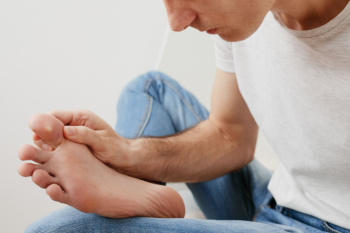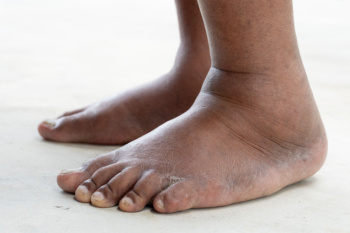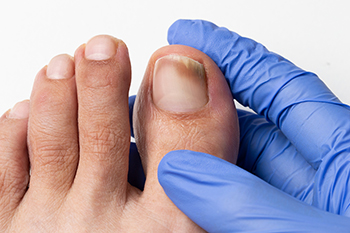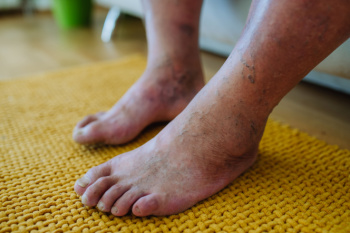Items filtered by date: April 2024
Plantar Wart Treatment
 Plantar warts are common skin growths that appear on the soles of the feet. They are caused by exposure to the human papillomavirus, or HPV. These warts are often rough and spongy, and can be painful when pressure is applied while walking or standing. Plantar warts can be treated using a range of methods, depending on their size and severity. Salicylic acid, which gradually peels away the infected skin, may be used for mild cases. For more stubborn warts, a podiatrist may recommend cryotherapy, which uses liquid nitrogen to freeze and kill the wart tissue. Another effective method is laser treatment, where concentrated beams of light are used to destroy the wart. In some cases, minor surgical procedures might be necessary to remove the wart. Podiatrists, or foot doctors, are trained in the treatment of plantar warts. If you have plantar warts, it is suggested that you schedule an appointment with this type of doctor for effective solutions.
Plantar warts are common skin growths that appear on the soles of the feet. They are caused by exposure to the human papillomavirus, or HPV. These warts are often rough and spongy, and can be painful when pressure is applied while walking or standing. Plantar warts can be treated using a range of methods, depending on their size and severity. Salicylic acid, which gradually peels away the infected skin, may be used for mild cases. For more stubborn warts, a podiatrist may recommend cryotherapy, which uses liquid nitrogen to freeze and kill the wart tissue. Another effective method is laser treatment, where concentrated beams of light are used to destroy the wart. In some cases, minor surgical procedures might be necessary to remove the wart. Podiatrists, or foot doctors, are trained in the treatment of plantar warts. If you have plantar warts, it is suggested that you schedule an appointment with this type of doctor for effective solutions.
Plantar warts can be very uncomfortable. If you need your feet checked, contact Desiree Garzon, DPM from County Wide Foot, Ankle, & Wound Care. Our doctor will assist you with all of your foot and ankle needs.
About Plantar Warts
Plantar warts are the result of HPV, or human papillomavirus, getting into open wounds on the feet. They are mostly found on the heels or balls of the feet.
While plantar warts are generally harmless, those experiencing excessive pain or those suffering from diabetes or a compromised immune system require immediate medical care. Plantar warts are easily diagnosed, usually through scraping off a bit of rough skin or by getting a biopsy.
Symptoms
- Lesions on the bottom of your feet, usually rough and grainy
- Hard or thick callused spots
- Wart seeds, which are small clotted blood vessels that look like little black spots
- Pain, discomfort, or tenderness of your feet when walking or standing
Treatment
- Freezing
- Electric tool removal
- Laser Treatment
- Topical Creams (prescription only)
- Over-the-counter medications
To help prevent developing plantar warts, avoid walking barefoot over abrasive surfaces that can cause cuts or wounds for HPV to get into. Avoiding direct contact with other warts, as well as not picking or rubbing existing warts, can help prevent the further spread of plantar warts. However, if you think you have developed plantar warts, speak to your podiatrist. He or she can diagnose the warts on your feet and recommend the appropriate treatment options.
If you have any questions please feel free to contact our offices located in Boynton Beach, and Wellington, FL . We offer the newest diagnostic and treatment technologies for all your foot and ankle needs.
Causes of Foot Swelling
 Swelling in the feet, otherwise known as edema, has a range of mild to severe causes. Mild edema may result from standing or sitting for long periods, especially in hot weather. This causes fluid to pool in the lower extremities. Swelling can also be a side effect of certain medications, hormonal changes, or dietary factors like excessive salt intake. In more severe cases, edema may be a sign of underlying medical conditions, such as heart failure, kidney disease, or venous insufficiency. In these cases, the body’s fluid balance is off, leading to fluid retention and swelling in the feet and ankles. Certain injuries, infections, or blood clots in the legs can also cause localized edema. Podiatrists, or foot doctors, can diagnose the underlying cause of foot swelling. They may recommend lifestyle modifications, compression therapy, medication management, or other treatments to address the cause. If you have swelling in the feet or ankles, it is suggested that you make an appointment with a podiatrist to find relief.
Swelling in the feet, otherwise known as edema, has a range of mild to severe causes. Mild edema may result from standing or sitting for long periods, especially in hot weather. This causes fluid to pool in the lower extremities. Swelling can also be a side effect of certain medications, hormonal changes, or dietary factors like excessive salt intake. In more severe cases, edema may be a sign of underlying medical conditions, such as heart failure, kidney disease, or venous insufficiency. In these cases, the body’s fluid balance is off, leading to fluid retention and swelling in the feet and ankles. Certain injuries, infections, or blood clots in the legs can also cause localized edema. Podiatrists, or foot doctors, can diagnose the underlying cause of foot swelling. They may recommend lifestyle modifications, compression therapy, medication management, or other treatments to address the cause. If you have swelling in the feet or ankles, it is suggested that you make an appointment with a podiatrist to find relief.
Swollen feet can be a sign of an underlying condition. If you have any concerns, contact Desiree Garzon, DPM of County Wide Foot, Ankle, & Wound Care. Our doctor can provide the care you need to keep you pain-free and on your feet.
Swollen feet are a common ailment among pregnant women and people who stand or sit for extended periods. Aging may increase the possibility of swollen feet and patients who are obese often notice when their feet are swelling too. There may be medical reasons why swollen feet occur:
- Phlebitis - A condition that causes the veins to become inflamed and can also cause leg pain.
- Liver disease - This may lead to low blood levels of albumin which is a protein. This can cause fluid in the blood to pass into the tissues and several areas of the body can become swollen.
- Heart failure - When the heart doesn’t pump properly the blood that is normally pumped back to the heart can pool in the veins of the legs causing swollen feet.
- Kidney disease - One of the main functions of the kidneys is releasing excess fluid in the body. This type of condition can make it difficult for the kidneys to function properly, and as a result the feet may become swollen.
- Deep-vein thrombosis (DVT)- This is a serious condition where blood clots form in the veins of the legs. They can block the return of blood from the legs to the heart which may cause the feet to swell. It is important to be treated by a podiatrist if this condition is present.
Swollen feet can also be caused by bone and tendon conditions, including fractures, arthritis, and tendinitis. Additionally, there may be skin and toenail conditions and an infection may cause the feet to swell. Patients who take medicine to treat high blood pressure may be prone to getting swollen feet.
Many patients elevate their feet to help relieve the swelling and this is generally a temporary remedy. When a podiatrist is consulted the reason behind the swelling can be uncovered and subsequently treated.
If you have any questions please feel free to contact our offices located in Boynton Beach, and Wellington, FL . We offer the newest diagnostic tools and technology to treat your foot and ankle needs.
Causes and Implications of Toenail Fungus

Onychomycosis, commonly known as toenail fungus, is a fungal infection that affects the toenails, leading to discoloration, thickening, and brittleness. This condition occurs when dermatophyte fungi invade the nail bed, typically thriving in warm, moist environments such as sweaty shoes or communal showers. Additionally, yeast and mold can also contribute to the development of onychomycosis. Several factors increase the risk of contracting this infection, including aging, poor circulation, and a weakened immune system. Other factors include trauma to the nail and pre-existing conditions like diabetes or athlete's foot. Furthermore, habits such as walking barefoot in public areas or sharing nail grooming tools can facilitate fungal transmission. Onychomycosis not only affects the aesthetic appearance of the nails but can also cause discomfort, pain, and difficulty in walking if left untreated. If you have developed toenail fungus, it is strongly suggested that you visit a podiatrist who can offer you treatment options which often include prescribed medication for complete healing.
For more information about treatment, contact Desiree Garzon, DPM of County Wide Foot, Ankle, & Wound Care. Our doctor can provide the care you need to keep you pain-free and on your feet.
Toenail Fungus Treatment
Toenail fungus is a condition that affects many people and can be especially hard to get rid of. Fortunately, there are several methods to go about treating and avoiding it.
Antifungals & Deterrence
Oral antifungal medicine has been shown to be effective in many cases. It is important to consult with a podiatrist to determine the proper regiment for you, or potentially explore other options.
Applying foot powder on the feet and shoes helps keep the feet free of moisture and sweat.
Sandals or open toed shoes – Wearing these will allow air movement and help keep feet dry. They also expose your feet to light, which fungus cannot tolerate. Socks with moisture wicking material also help as well.
If you have any questions please feel free to contact our offices located in Boynton Beach, and Wellington, FL . We offer the newest diagnostic tools and technology to treat your foot and ankle needs.
Daily Habits for Diabetic Foot Care
 Daily habits for diabetic foot care are essential to prevent complications that can arise from diabetes, such as infections and ulcers. Regular inspection of the feet for cuts, blisters, or red spots can help address any issues head-on. It is also important the feet are kept clean and moisturized, while avoiding lotion between the toes to prevent fungal infection. Proper shoe choice can enhance comfort and prevent blisters. It is helpful not to walk barefoot to reduce the risk of injury. Additionally, managing blood sugar levels helps maintain healthy circulation and nerve function in the feet. Regular check-ups with a podiatrist play a key role in diabetic foot care. These foot doctors can professionally assess the health of your feet, provide specialized care for any issues detected, and offer personalized advice on proper foot care practices. These visits help in early detection and treatment of potential foot problems, reducing the risk of serious complications. If you are a diabetic patient at risk for foot complications, it is suggested that along with daily foot care, you add a podiatrist to your health care team.
Daily habits for diabetic foot care are essential to prevent complications that can arise from diabetes, such as infections and ulcers. Regular inspection of the feet for cuts, blisters, or red spots can help address any issues head-on. It is also important the feet are kept clean and moisturized, while avoiding lotion between the toes to prevent fungal infection. Proper shoe choice can enhance comfort and prevent blisters. It is helpful not to walk barefoot to reduce the risk of injury. Additionally, managing blood sugar levels helps maintain healthy circulation and nerve function in the feet. Regular check-ups with a podiatrist play a key role in diabetic foot care. These foot doctors can professionally assess the health of your feet, provide specialized care for any issues detected, and offer personalized advice on proper foot care practices. These visits help in early detection and treatment of potential foot problems, reducing the risk of serious complications. If you are a diabetic patient at risk for foot complications, it is suggested that along with daily foot care, you add a podiatrist to your health care team.
Diabetic foot care is important in preventing foot ailments such as ulcers. If you are suffering from diabetes or have any other concerns about your feet, contact Desiree Garzon, DPM from County Wide Foot, Ankle, & Wound Care. Our doctor can provide the care you need to keep you pain-free and on your feet.
Diabetic Foot Care
Diabetes affects millions of people every year. The condition can damage blood vessels in many parts of the body, especially the feet. Because of this, taking care of your feet is essential if you have diabetes, and having a podiatrist help monitor your foot health is highly recommended.
The Importance of Caring for Your Feet
- Routinely inspect your feet for bruises or sores.
- Wear socks that fit your feet comfortably.
- Wear comfortable shoes that provide adequate support.
Patients with diabetes should have their doctor monitor their blood levels, as blood sugar levels play such a huge role in diabetic care. Monitoring these levels on a regular basis is highly advised.
It is always best to inform your healthcare professional of any concerns you may have regarding your feet, especially for diabetic patients. Early treatment and routine foot examinations are keys to maintaining proper health, especially because severe complications can arise if proper treatment is not applied.
If you have any questions please feel free to contact our offices located in Boynton Beach, and Wellington, FL . We offer the newest diagnostic and treatment technologies for all your foot and ankle needs.
Plantar Warts Can Be Treated!
Problems From Wearing High Heels

Wearing high heels can lead to a variety of discomforts and health issues. Continuous friction and pressure from ill-fitting shoes can cause blisters, corns, and calluses. Moreover, the unnatural foot position in high heels can contribute to ankle sprains, stress fractures in the foot or ankle bones, and even long-term problems like arthritis. The altered posture and gait induced by high heels can lead to pain in the knees, hips, and lower back. Additionally, the pressure on the toes can result in deformities like hammertoes or ingrown toenails. A podiatrist can provide valuable assistance in managing these issues. They can offer advice on proper footwear selection and fitting, as well as prescribe custom-made orthotic inserts to alleviate pressure points and improve foot mechanics. Podiatrists can also treat existing foot problems such as blisters, corns, and ingrown toenails, and provide guidance on stretching and strengthening exercises to mitigate the impact of high heels on foot health. If you wear high heels and are experiencing foot pain or any other foot problems, it is suggested that you make an appointment with a podiatrist for care.
High heels have a history of causing foot and ankle problems. If you have any concerns about your feet or ankles, contact Desiree Garzon, DPM from County Wide Foot, Ankle, & Wound Care. Our doctor can provide the care you need to keep you pain-free and on your feet.
Effects of High Heels on the Feet
High heels are popular shoes among women because of their many styles and societal appeal. Despite this, high heels can still cause many health problems if worn too frequently.
Which Parts of My Body Will Be Affected by High Heels?
- Ankle Joints
- Achilles Tendon – May shorten and stiffen with prolonged wear
- Balls of the Feet
- Knees – Heels cause the knees to bend constantly, creating stress on them
- Back – They decrease the spine’s ability to absorb shock, which may lead to back pain. The vertebrae of the lower back may compress.
What Kinds of Foot Problems Can Develop from Wearing High Heels?
- Corns
- Calluses
- Hammertoe
- Bunions
- Morton’s Neuroma
- Plantar Fasciitis
How Can I Still Wear High Heels and Maintain Foot Health?
If you want to wear high heeled shoes, make sure that you are not wearing them every day, as this will help prevent long term physical problems. Try wearing thicker heels as opposed to stilettos to distribute weight more evenly across the feet. Always make sure you are wearing the proper shoes for the right occasion, such as sneakers for exercising. If you walk to work, try carrying your heels with you and changing into them once you arrive at work. Adding inserts to your heels can help cushion your feet and absorb shock. Full foot inserts or metatarsal pads are available.
If you have any questions please feel free to contact our offices located in Boynton Beach, and Wellington, FL . We offer the newest diagnostic and treatment technologies for all your foot and ankle needs.

